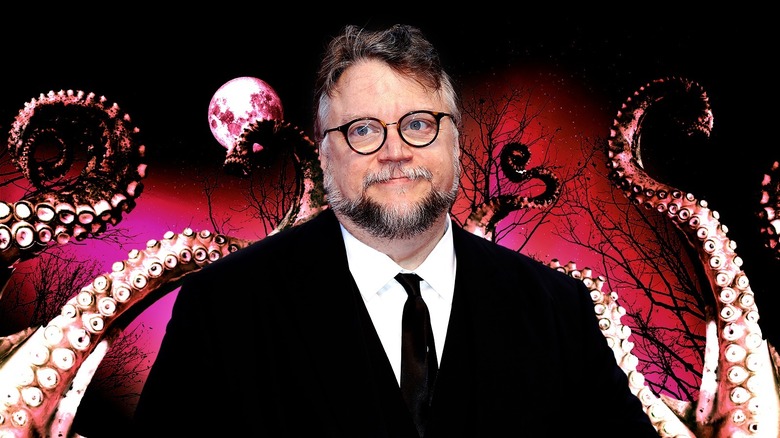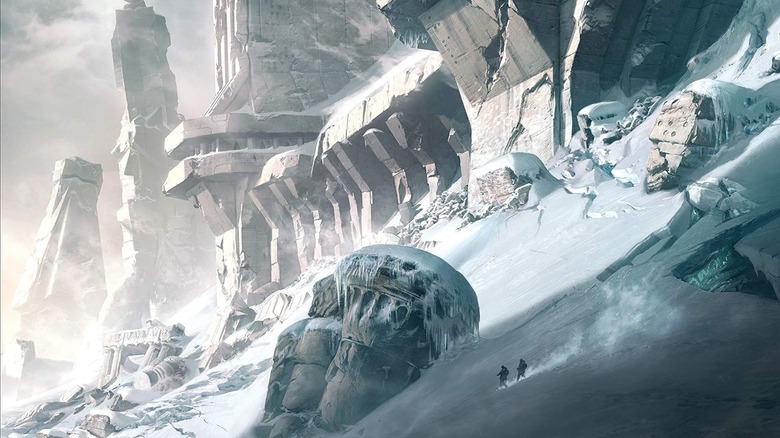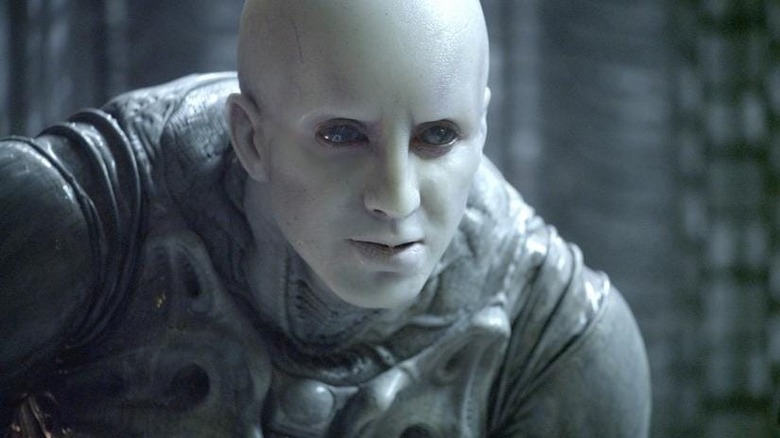Lovecraft's Best Story Is Ripe For Adaptation (And Guillermo Del Toro Should Still Direct It)
There's a widespread opinion that H.P. Lovecraft's stories are impossible to adapt for film and television. Quite frankly, that claim is bogus. Sure, the author was all about emphasizing the fear of the unknown and forcing readers to use their imaginations in order to visualize unfathomable creatures. The idea is that seeing these monsters invokes madness in the unfortunate souls who incur their wrath, and giving away the goods undermines that notion. It's a neat concept, but it wasn't the only type of horror in his arsenal.
"At the Mountains of Madness" actually describes the terrifying beings at the heart of the story, making it one of the most "cinematic" tales in Lovecraft's oeuvre. Unfortunately, Hollywood is reluctant to greenlight an adaptation, even though Guillermo del Toro has been trying to get it off the ground for almost two decades. Heck, Tom Cruise was reportedly attached to star in the unproduced film, only for the project to fall apart.
So, what happened?
Well, a couple of things. The movie would have cost at least $150 million to produce, which was seen as risky as del Toro wanted an R rating. On top of that, Ridley Scott made his own Lovecraftian-esque horror film and ruined everything.
Despite these setbacks, though, del Toro hasn't ruled out resurrecting this dream project. Now that his stock is higher than it's ever been and prototype movies for "At the Mountains of Madness" have been made, it's time that del Toro was entrusted to make this dream a reality.
At the Mountains of Madness is ripe for an adaptation
"At the Mountains of Madness" tells the story of an Antarctic expedition that goes awry. What begins as a scientific voyage into uncharted territory leads to the discovery of an ancient dilapidated city in the mountains. The city was also built by an ancient alien race known as the Elder Things, who created shapeshifting creatures, shoggoths, to do their bidding — until it ended in disaster.
While they are few and far between these days, Hollywood has a rich history of making movies about lost societies that harbor mysterious creatures. In fact, elements of lost-world adventure stories can be found in recent blockbusters like "Jungle Cruise" and "Shang-Chi and the Legend of the Ten Rings," both of which were massively successful. An "At the Mountain of Madness" film could provide similar types of wonders, albeit with more horror, madness, death, and monsters.
Plus, the monsters are cool. "At the Mountains of Madness" describes some of the creatures in substantial detail. The shoggoths, for example, are slimy amoeba-like monstrosities with eyes all over their surfaces. They can also change shape at will and crush their opponents, and these characteristics would make them frightening as horror movie antagonists. Del Toro also envisioned some cool creatures for the movie, and he shared the concept footage on his Instagram.
However, there was one particular movie that served as a prototype of sorts for "At the Mountains of Madness" — proving that the overall concept works on film.
Prometheus already showed glimpses of what an At the Mountains of Madness could be
The "Alien" franchise is indebted to H.P. Lovecraft, especially regarding the idea that humans share the universe with unfathomable entities that seek to cause us harm. Dan O'Bannon's script for "Alien" even includes words like "squamous," which Lovecraft often used to describe the nightmare-inducing creatures in his own work.
That said, "Prometheus" is arguably the most obvious Lovecraftian film in the franchise, and it echoes "At the Mountain of Madness" in a few ways. Scott's film follows a team of explorers on an expedition into the unknown, where they discover an ancient civilization. Furthermore, both tales of terror explore themes such as creationism and the pursuit of forbidden knowledge. And if that isn't enough evidence, the alien planet in Scott's movie also boasts plenty of mountains and caves.
Guillermo del Toro has even acknowledged that the release of "Prometheus" effectively dented his hopes of making "At the Mountains of Madness." In 2012, he confirmed that Scott's blockbuster shared too many thematic similarities with his Lovecraft adaptation, and their climaxes were also alike. This forced him to put his dream project on hold, but as del Toro has shown in the past, he doesn't give up on his dreams.
Trust in Guillermo del Toro
It's been over a decade since Guillermo del Toro told us that his Lovecraft adaptation was on hold, but he hasn't lost the desire. Last year, the director revealed that there may be hope for "At the Mountains of Madness" yet, noting that he might develop it as a stop-motion animated project, similar to his Oscar-winning "Pinocchio" feature — another movie that languished in development hell for years.
Similarly, his upcoming "Frankenstein" film comes after years of struggling to bring his version of Mary Shelley's story to the screen. It seems that studios are finally starting to realize that del Toro's ideas are actually great and deserved to be backed years ago. He clearly knows what he's doing.
Ever since "At the Mountains of Madness" was put on hold, del Toro has only gotten better. He created a successful kaiju/robot franchise with "Pacific Rim." Meanwhile, "The Shape of Water," Nightmare Alley," and "Pinocchio" generated some Oscars buzz. He has a track record of making original movies that appeal to mainstream viewers, and he understands Lovecraft more than most.
Look, del Toro is the perfect filmmaker to adapt Lovecraft
Guillermo del Toro's never-say-die attitude and ongoing commitment to bringing us "At the Mountains of Madness" deserves some praise. It shows that he's passionate about the project, and he's had years to rework and finesse his ideas to ensure that the story translates to the screen. He gets it.
Moreover, the influence of Lovecraft permeates some of del Toro's other work. Mike Mignola's "Hellboy" comics were inspired by Lovecraftian monsters, and del Toro honored that aspect in his movie adaptations. "Hellboy II: The Golden Army" even boasts a secret fantastical underground marketplace where supernatural creatures stay hidden from humans. It's a much warmer place than the Elder Things' city in "At the Mountains of Madness," but the idea of ancient mythical societies existing in the hidden corners of Earth is similar.
Elsewhere, "Pinocchio" and "Frankenstein" (assuming it gets made) are both creationist stories that deal with otherworldly concepts. "Frankenstein" is also a story about the dark side of scientific oversight, similar to Lovecraft's story about the Antarctic expedition from hell. If the scientists in "At the Mountains of Madness" didn't let curiosity get the better of them, they would have been fine.
"At the Mountains of Madness" would probably be del Toro's bleakest tale to date, but Lovecraft's work contains themes and ideas that he's familiar with. However, this movie would allow him to explore these concepts from a different angle. More than anything, though, he's an exceptional filmmaker who loves monsters — and that alone makes him the perfect choice to bring Lovecraft's baby to the screen.




